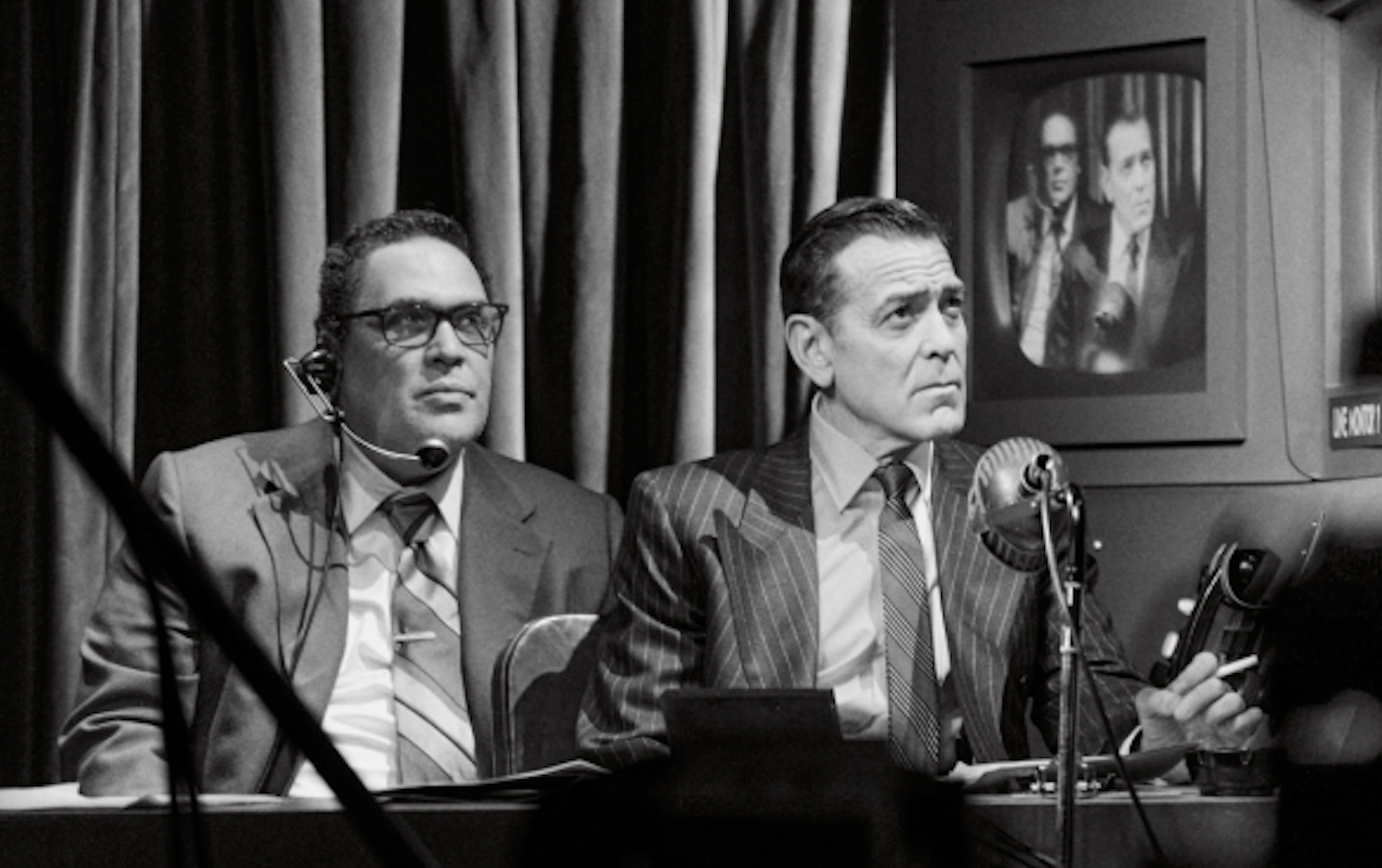GOOD NIGHT AND GOOD LUCK
by George Clooney and Grant Heslov
Based upon their screenplay
Directed by David Cromer
Starring George Clooney
Wintergarden Theatre
Official Website
Reviewed by David Spencer
Collectively, with a full audience, Good Night and Good Luck resonates well. As well it may; it tells a great American story about a great American journalist unafraid to speak truth to power. But more than that, the experience is a kind of intellectuals’ theme park. Not only does it recreate, with more-than-usual dramatized accuracy, the before-during-after advent of CBS journalist-broadcaster Edward R. Murrow’s famous 1954 expose on Senator Joseph McCarthy—which has more resonance in 2025 than at any time since it aired, and for all the obvious reasons—but because George Clooney and Grant Heslov, in adapting their screenplay for the stage, in league with director David Cromer, have gone all out to replicate the tone and paraphrase the TV studio tech of the docudrama film. Its spectacle is more modest and contained than Ivo van Hove’s treatment of Network, but it’s in keeping with a more modest and contained story. Good Night and Good Luck can be viewed as the warning of things to come without vigilance; and Network the fulfillment. But it still has enough effects involving TV screens, mammoth projections, quick cuts to segmented playing spaces, to be the MSNBC-watcher’s Starlight Express.
But because it is a Broadway play, because its mostly off-camera cast are regular-sized humans on the Wintergarden Theatre’s large proscenium (the live screen treatment is mostly reserved for star George Clooney as Murrow), there is a quality that some may find reductive. The film had an intense intimacy that the play, at least as packaged, is physically unable to replicate.
If you don’t know the film, it may not matter to you. If you do know the film, you may be willing to uncritically accept the theatrical filtering on its own terms. And whether you do or don’t, you may also find the experience a bit thin; the drama is about a large staff in a corporate environment assessing how to react to a fraught national situation. With so much time taken in discussing the issues and ramifications of the actions being taken, scripted characterization is necessarily reduced to essences communicated by bold strokes to anchor emotion and quick verbal wit to make thematic points.
Thus, whether Murrow’s broadcast being the eye of the storm provides substance enough for you to find the totality to be satisfying—despite being thin—will be felt personally. Rarely has the phrase “Your mileage may vary” been more apt. (And unknown, until, in years to come, the play is assayed in another prominent venue by a director who strips away all the tech bells and whistles and reduces the production concept, as much as possible, to a black box—which itself could be TV-symbolism—is whether that would create enough alchemical change to make the net effect seem deeper, less debatable.)
To a certain degree, this extends to the performances. Taking just one example from the supporting cast: There’s no bigger fan of Canadian actor Paul Gross than I, and there’s some who have called his turn as network executive William Paley “terrific.” And there’s no question you’re watching a charismatic performer of significant personality and skill—but he doesn’t have much time to do anything but choose his primary color and variously shade it. In the film, Paley, as played by Frank Langella, limited to much the same kind of choice, was portrayed as an ominous figure of quiet, brooding power. In the play, Gross plays Paley as the deceptively collegial executive pal, who’s “one of you” and “gets you” even when, sorry about that, he has to lower the boom and cut you off at the knees. It’s a shallow portrayal, but it has to be; this is samurai acting.
And there are those who will disagree over George Clooney. Clooney directed the source film, and in it played the supporting role of Murrow’s collaborative associate, Fred Friendly (Murrow there being played by David Strathairn). In the play, Clooney has moved up to the role of Murrow. My politically-historically brilliant companion of the afternoon found him effective and persuasive. I experienced the performance of an excellent actor who seemed to be playing Murrow rather than being Murrow.
What’s unequivocal is the production’s polish, narrative economy and expertise in all departments, due to the slick and and tasteful direction of David Cromer.
What’s also unequivocal is that Good Night and Good Luck didn’t get there first. First was a 1986 TV movie on HBO called Murrow, written by “golden age” TV veteran Ernest Kinoy, directed by Jack Gold and starring Daniel J. Travanti, brilliant and subtle, as Murrow (you can see it on YouTube). How it depicts its McCarthy broadcast episode, though compressed as the film’s centerpiece (it dramatizes Murrow’s wartime career earlier and his final years after), is VERY similarly scripted; enough for me to wonder if Clooney and Co. quietly optioned it as part of their source material. Good Night and Good Luck is easily better filmmaking; but the more conventional Murrow, for me, is better storytelling.
And both, for me, are fuller experiences than the play. No mistake, the play could not be more relevant; the true story of a courageous broadcaster confronting and exposing authoritarianism sufficiently head-on to trigger its takedown by the people in government who should have been taking it down all along, by example showing them where their balls ought to be, could not be more timely.
It’s just that, if you’re already in the choirloft, I’m not so sure you need the preaching. Though perhaps you’d take solace in the reassurance that all is not lost…
